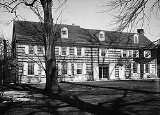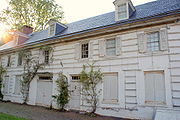
Wyck House
Encyclopedia
The Wyck House, also called the Haines House and the Hans Millan House, is a historic mansion, museum, garden, and home farm in the Germantown
section of Philadelphia, Pennsylvania
. It was recognized as a National Historic Landmark
in 1971; it is a contributing property
of the Colonial Germantown Historic District
.
and was a descendant of a Swiss Mennonite family. His daughter, Margaret, married a Dutch Quaker
named Dirk Jansen, a linen weaver who prospered in the first half of the 18th-century. By his death, he was listed as a gentleman and had Anglicized his name to Dirk Johnson. Their daughter, Catherine, married Caspar Wistar, a German who became a Quaker and amassed a sizable fortune as a button maker, glassmaker and investor in land.
In the next generation, Margaret Wistar married Reuben Haines I, a brewer and merchant of English descent. Their son Caspar Wistar Haines continued the family businesses and married Hannah Marshall, a member of another Quaker family. Wyck passed to Reuben and Jane Bowne Haines and then to their youngest daughter, Jane Reuben Haines, who lived here until 1911, carefully preserving the house, furnishings and gardens.
In the eighth generation, Jane B. Haines founded the first school of horticulture for women, The Pennsylvania School of Horticulture of Ambler, which is now Temple Ambler, and one brother, Caspar, helped design the Mexican railway system; while another, Robert, invented a gauge for measuring steel in rolling mills.
The last owners, Robert and Mary Haines, were fruit growers; Robert patented a device to press apples for a more natural tasting juice. Wyck's family descendants are still very involved in the life of their home and community.
 Today, Wyck is maintained as a house museum. The gardens are known for their collection of old roses, including 30 varieties, and the home farm has become a staple of the community.
Today, Wyck is maintained as a house museum. The gardens are known for their collection of old roses, including 30 varieties, and the home farm has become a staple of the community.
The house is actually an accumulation of 18th-century parts: the hall (c. 1700-20), the front parlor (1736) and the library and dining room from (1771–73, which replaced a c. 1690 log structure.)
The house has been little altered since 1824 when Philadelphia architect William Strickland
dramatically rearranged its interior spaces to create an open plan, allowing light to flood each room and bringing the pleasures of the garden inside.
Environmental Education, programs that focus on history of Quakerism, Native Americans, Colonial life, and Philadelphia. These programs foster literacy and writing while also giving children a chance to do hands-on activities such as arts and crafts and gardening.
Currently, Wyck’s Farmers Market provides the sole opportunity to buy beautifully grown, extremely fresh produce in the immediate neighborhood. In 2008, approximately 2,800 people visited the Farmers Market over the course of its seven-month season. Unlike at most urban Farmers Markets, Wyck market-goers have the opportunity to stroll through the gardens and see where and how their food is grown, and Wyck garden staff is always available to answer questions about growing and using fresh food. Wyck’s surplus produce is sold to area restaurants and at the Fair Food Farmstand at the Reading Terminal Market
, or donated to neighborhood senior centers.
Germantown, Philadelphia, Pennsylvania
Germantown is a neighborhood in the northwest section of the city of Philadelphia, Pennsylvania, United States, about 7–8 miles northwest from the center of the city...
section of Philadelphia, Pennsylvania
Pennsylvania
The Commonwealth of Pennsylvania is a U.S. state that is located in the Northeastern and Mid-Atlantic regions of the United States. The state borders Delaware and Maryland to the south, West Virginia to the southwest, Ohio to the west, New York and Ontario, Canada, to the north, and New Jersey to...
. It was recognized as a National Historic Landmark
National Historic Landmark
A National Historic Landmark is a building, site, structure, object, or district, that is officially recognized by the United States government for its historical significance...
in 1971; it is a contributing property
Contributing property
In the law regulating historic districts in the United States, a contributing resource or contributing property is any building, structure, or object which adds to the historical integrity or architectural qualities that make the historic district, listed locally or federally, significant...
of the Colonial Germantown Historic District
Colonial Germantown Historic District
The Colonial Germantown Historic District is a designated National Historic Landmark District in the Germantown and Mount Airy neighborhoods of Philadelphia, Pennsylvania along both sides of Germantown Avenue...
.
History
Wyck's earliest owner was Hans Milan, a Quaker who came from GermanyGermany
Germany , officially the Federal Republic of Germany , is a federal parliamentary republic in Europe. The country consists of 16 states while the capital and largest city is Berlin. Germany covers an area of 357,021 km2 and has a largely temperate seasonal climate...
and was a descendant of a Swiss Mennonite family. His daughter, Margaret, married a Dutch Quaker
Religious Society of Friends
The Religious Society of Friends, or Friends Church, is a Christian movement which stresses the doctrine of the priesthood of all believers. Members are known as Friends, or popularly as Quakers. It is made of independent organisations, which have split from one another due to doctrinal differences...
named Dirk Jansen, a linen weaver who prospered in the first half of the 18th-century. By his death, he was listed as a gentleman and had Anglicized his name to Dirk Johnson. Their daughter, Catherine, married Caspar Wistar, a German who became a Quaker and amassed a sizable fortune as a button maker, glassmaker and investor in land.
In the next generation, Margaret Wistar married Reuben Haines I, a brewer and merchant of English descent. Their son Caspar Wistar Haines continued the family businesses and married Hannah Marshall, a member of another Quaker family. Wyck passed to Reuben and Jane Bowne Haines and then to their youngest daughter, Jane Reuben Haines, who lived here until 1911, carefully preserving the house, furnishings and gardens.
In the eighth generation, Jane B. Haines founded the first school of horticulture for women, The Pennsylvania School of Horticulture of Ambler, which is now Temple Ambler, and one brother, Caspar, helped design the Mexican railway system; while another, Robert, invented a gauge for measuring steel in rolling mills.
The last owners, Robert and Mary Haines, were fruit growers; Robert patented a device to press apples for a more natural tasting juice. Wyck's family descendants are still very involved in the life of their home and community.

Architecture
Wyck is an architecturally innovative house with an old-fashioned skin. From the outside it appears colonial in plan and design with some fashionable accents such as the late 18th-century whitewashed stucco.The house is actually an accumulation of 18th-century parts: the hall (c. 1700-20), the front parlor (1736) and the library and dining room from (1771–73, which replaced a c. 1690 log structure.)
The house has been little altered since 1824 when Philadelphia architect William Strickland
William Strickland (architect)
William Strickland , was a noted architect in nineteenth-century Philadelphia, Pennsylvania and Nashville, Tennessee.-Life and career:...
dramatically rearranged its interior spaces to create an open plan, allowing light to flood each room and bringing the pleasures of the garden inside.
Education at Wyck
Wyck offers a variety of interesting educational programs for school groups. The types of programs include, but are not limited to:Environmental Education, programs that focus on history of Quakerism, Native Americans, Colonial life, and Philadelphia. These programs foster literacy and writing while also giving children a chance to do hands-on activities such as arts and crafts and gardening.
Home farm
For more than 250 years, Wyck existed as a working farm. Today that legacy continues with Wyck's Home Farm. With the support of the Samuel S. Fels Fund, the Home Farm was established in 2007. Large vegetable and herb gardens are designed with paths wide enough for easy walking. Strawberry and two raspberry beds exist, along with fruit trees, an asparagus bed, a cutting garden, and a large grape arbor. The various gardens are managed according to traditional gardening techniques, and no synthetic chemicals are used. Produce from the Home Farm is sold at Wyck’s seasonal, on-site weekly Farmers Market. The produce is available to neighbors at below market prices. We have partnered with the Food Trust to serve as many people as possible, regardless of their means. We accept vouchers from the federally funded Farmers Market Nutrition Program as well as food stamps.Currently, Wyck’s Farmers Market provides the sole opportunity to buy beautifully grown, extremely fresh produce in the immediate neighborhood. In 2008, approximately 2,800 people visited the Farmers Market over the course of its seven-month season. Unlike at most urban Farmers Markets, Wyck market-goers have the opportunity to stroll through the gardens and see where and how their food is grown, and Wyck garden staff is always available to answer questions about growing and using fresh food. Wyck’s surplus produce is sold to area restaurants and at the Fair Food Farmstand at the Reading Terminal Market
Reading Terminal Market
Reading Terminal Market is an enclosed public market found at 12th and Arch Streets in downtown Philadelphia, Pennsylvania. Over one hundred merchants offer fresh produce, meats, fish, groceries, ice cream, flowers, baked goods, crafts, books, clothing, and specialty and ethnic foods...
, or donated to neighborhood senior centers.
External links
- Official website
- Wyck House at the Historic American Buildings SurveyHistoric American Buildings SurveyThe Historic American Buildings Survey , Historic American Engineering Record , and Historic American Landscapes Survey are programs of the National Park Service established for the purpose of documenting historic places. Records consists of measured drawings, archival photographs, and written...
- Listing at Philadelphia Architects and Buildings

